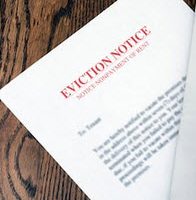Can Bankruptcy Stop an Eviction in Indiana?

Residential evictions are bad news. Most leases include personal property liens. So, if the tenant falls behind on rent, the landlord can do more than evict the tenant. The landlord can also seize and sell electronics, appliances, and any other valuable item in the dwelling.
Commercial evictions are bad news as well. These acts make your business look financially unstable, and not one wants to have a commercial relationship with such an enterprise.
In both these cases, eviction is a public spectacle. Everyone in the neighborhood, apartment complex, or shopping area knows that the landlord has evicted the tenant.
Chapter 7 and Chapter 13 bankruptcy, on the other hand, are mostly private. True, bankruptcy filings are public record. But when debtors file bankruptcy, their creditors do not post notices on their doors. Doing so would be a violation of the Automatic Stay.
Automatic Stay and Debt Discharge
Before 2005, these two aspects of bankruptcy helped distressed tenants who could not pay their rent or faced eviction for another reason. Section 362 of the Bankruptcy Code prohibits any adverse action during bankruptcy. As long as the case is pending, moneylenders may only contact creditors, or take action against them, if they have special permission from the bankruptcy judge.
Additionally, rent is an unsecured debt. In exchange for paying rent, the tenant receives the intangible right to occupy a space. The tenant usually offers no property security, other than a security deposit, and most rental agreements do not include collateral. Even to this day, if you have past-due rent to a prior landlord, bankruptcy discharges that debt, in most cases.
But then along came the oddly-named Bankruptcy Abuse Prevention and Consumer Protection Act. BAPCPA changed the landlord-tenant rules. Now, if a landlord obtains an eviction judgement, the landlord may proceed with the eviction, even if the tenant files bankruptcy.
Procedural Matters
To better understand this bankruptcy process, it’s important to understand how the eviction process normally works in Indiana.
Typically, when the tenant owes late rent, the landlord delivers a notice of intent to evict to the tenant. Most tenants ignore this notice, because it has no legal impact.
However, given the 2005 BAPCPA changes, that notice may be your cue to file bankruptcy. The Automatic Stay still prevents the landlord from filing an eviction action. If there is no such action, the landlord cannot evict the tenant.
Most evictions are in low-level justice courts. These forums are basically like Judge Judy without cameras. Typically, the judge hears the evidence and makes a decision on the spot. So, if you wait until after the hearing to file bankruptcy, it will probably be too late to stop the eviction.
The Adequate Protection Loophole
Some Indiana judges allow tenants in bankruptcy to stop post-judgement evictions if they deposit the next month’s rent into an escrow account.
The adequate protection loophole may come into play if there is a legitimate dispute as to the amount of past-due rent. For example, a landlord might drag her feet about replacing an HVAC unit. As a result, the tenant might buy a unit out of his own pocket and deduct the amount from the rent. Maybe the tenant has a legal right to do that, and maybe he does not. Either way, that’s probably a dispute for the bankruptcy judge to resolve.
Connect with Aggressive Lawyers
Tenants can still find refuge in bankruptcy, but the rules are different than they were a few years ago. For a free consultation with an experienced Chicago bankruptcy attorney, contact the Bentz Holguin Law Firm, LLC. We routinely handle matters in Illinois and Indiana.
Resource:
law.cornell.edu/uscode/text/11/362


